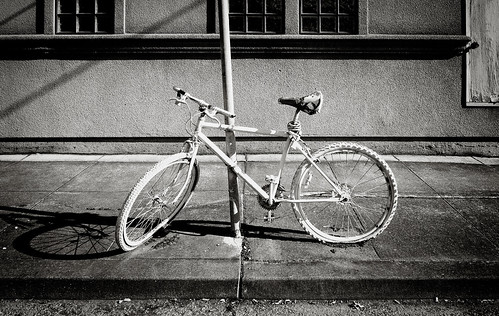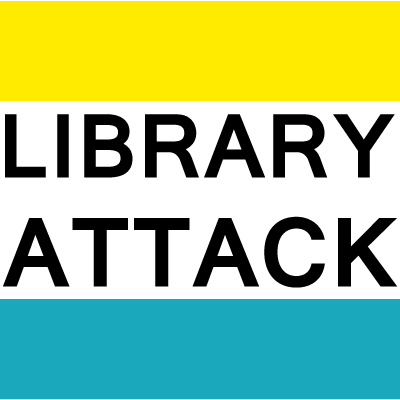
Ghost Bike – Emeryville CA flickr photo by roger jones shared under a Creative Commons (BY-NC) license
(If you aren’t familiar with them, go read about ghost bike memorials.)
I’ve been meaning to write a blog post about this topic for a while. There have been discussions in library circles about the need to change the language we use to describe things (a cornerstone of the profession) to better reflect society today, and to start to dismantle structural biases. The focus has largely been around race for good reason – like the 2016 example of Congress intervening to prevent the LCSH term “illegal alien” to be deprecated in favor of something less charged and racist, like “noncitizens” or “unauthorized immigration”. Some of my colleagues presented their work in this area at the 2018 JCLC, and also wrote about it for the 2019 ACRL President’s program – how they use “metadata justice” to better connect and reflect the communities their library supports.
And I didn’t really think much of social justice and metadata for my direct work until this year, when I noticed my colleagues — transportation librarians, other transportation professionals, librarians, whatever — using incorrect terminology. I was used to pushing back on outdated terminology around mobility, working on the SAE shared mobility glossary and continuing to bring those terms to the TRT and the larger transportation community. I work with cutting edge researchers pushing the boundaries of the field, so I kind of expect to be leading the charge when it comes to classification. It’s one of the functions I bring to the community. But then, through a discussion on a transportation librarian listserv it was clear we also had to have a communal discussion about safety, after somebody posted something about getting into an “accident” with a pedestrian or a cyclist. I didn’t want to engage, especially because I didn’t want to diminish any trauma my colleague might have experience when they hit the other person, but it became clear after some exchanges that my colleagues (mostly from highway focused state DOTs) were still using accident – a term we took out of the TRT in 2015, opting for crash or collision as appropriate. This came after a movement from safety circles to use “crash not accident”, a move that was promoted by the FMCSA. Here is most of their statement, which is so clear and rational:
Changing the way we think about events and the words we use to describe them affects the way we behave. Motor vehicle crashes occur “when a link or several links in the chain” are broken. Continued use of the word “accident” implies that these events are outside human influence or control. In reality, they are predictable results of specific actions.
Since we can identify the causes of crashes, we can take action to alter the effect and avoid collisions. These are not Acts of God but predictable results of the laws of physics.
The concept of “accident” works against bringing all appropriate resources to bear on the enormous problem of highway collisions. Use of “accident” fosters the idea that the resulting damage and injuries are unavoidable.
“Crash,” “collision,” and “injury” are more appropriate terms, and we encourage their use as substitutes for “accident.”
“A Crash is Not an Accident” by George L. Reagle, Associate Administrator for Motor Carriers. Updated Tuesday, March 4, 2014
Furthermore, through the research I help support and catalog I realized it’s also important to change the way we describe the participants in crashes and collisions. LCSH still uses “accident”. One of my new projects is to work with my cataloging colleagues to start the process of changing that. I know this will be a hard slog, but it’s just too important not to engage in the process.
Cars don’t hit pedestrians, drivers do. (Unless it’s a fully autonomous vehicle, but there is still so much to be worked out with liability and responsibility and that’s just a distracting edge case.) By ascribing responsibility to the vehicle, it erases the responsibility and the agency of the operator. Transportation safety advocates are pushing back on this idea, highlighting how pedestrian safety declines despite vehicles being safer for drivers. In 2019, there have been several cycling deaths because drivers were reckless – one notable example is of DC cycling advocate Dave Salovesh who fought for safer biking conditions and was killed by a speeding driver. (Another cyclist was killed on the same block days later, and Salovesh’s ghost bike has already been wiped out by a negligent driver.)
I bike commute most days – rain or shine. I do this because I prefer it to driving and parking, but also because I think it’s the most responsible way for me to travel given my geography and the climate emergency. It’s hard not to think with every pedestrian and cycling death or injury at the hand of a car or truck, “That could have been me.” And then yesterday, it almost was me.
This SUV just hit me. I’m rattled and angry. pic.twitter.com/aZUfimtVf2
— Kendra K. Levine (@tranlib) May 21, 2019
That whole Twitter thread is basically me freaking out as I rode away, angry crying to pick up my kid. I’m so thankful they weren’t with me, because it could have been so much worse. At the scene, both the driver and the passenger kept saying it was an “accident” that the driver couldn’t clearly see if it was safe to turn left yet kept going for it. I was ready to go into a long, angry rant about how there was nothing accidental in the situation, that it was their responsibility to proceed with caution if they couldn’t see oncoming traffic, and that they didn’t look for bikes in the bike lane on a bike boulevard – well, their disregard for the safety of others was very clear.
And the next morning, I’m still angry about the incident but it did get me to finally post thing thing about why we need to change the way we describe traffic collisions and crashes, and that we need to assign agency to the people involved. As I noted above, this is a social justice issue. It touches upon environmental impacts, public health, public safety, accessibility to opportunities, mobility. If we continue to prioritize single occupant vehicles (private or shared) at the expense of active modes of transportation or transit, nothing will change and people will continue to die.
I just hope that I won’t be another bike fatality at the hands of a careless or impatient driver.

Leave a Reply to bettybarcodeCancel reply